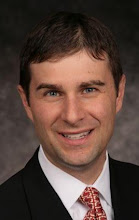I really enjoyed this debate last night. We had nearly 400 people in attendance, and I felt the issues our campaign is pushing were driving the discussion. Delegates learn so much more when we go head to head, rather than speaking to us separately. I wish we had more debates on the schedule and fewer "Meet and Mingles" but there is only so much you can do as a single county candidate.
Article at: http://bit.ly/bYPYdJ
Complete copy below:
Candidate says council form more efficient
Utah County » Commissioner disagrees, says just look north to S.L. County.
By Donald W. Meyers
The Salt Lake Tribune
Salt Lake Tribune
Updated:04/07/2010 10:31:27 PM MDT
Orem » A county-council form of government would better suit Utah County's growth than a three-member commission, a commission candidate argued Wednesday.
Joel D. Wright, who is challenging Utah County Commissioner Gary J. Anderson for the Republican nomination, rejected arguments that the current form of government is a more effective way of governing a fast-growing county.
"If three full-time county commissioners are efficient, then it would be more efficient to have just one commissioner, and we could call him king," Wright told the 300 people crowded into Noah Webster Academy's cafeteria/gymnasium for a candidate debate.
But Anderson said one only need look north at Salt Lake County to see that a council-mayor form of county government would be too expensive and inefficient. Anderson noted that between 2000 and 2001 -- the period when Salt Lake County transitioned from a three-member county commission to its current form of government -- the cost of government went from $832,490 to $2.9 million, a 346 percent increase. Today, Anderson said the county council costs Salt Lake County residents $7.7 million.
"And they're raising taxes and charging you for the police to come out," Anderson said, referring to the Unified Police Department's service fee.
Wright blasted the comparison, noting that Salt Lake County was dominated by Democrats, as opposed to Utah County, a Republican bastion. A better comparison, he said, was to Cache County, where its elected county council and full-time executive only cost $308,903.
If Utah County were to create a five-member county council, pay the part-time elected officials $20,000 a year and pay a full-time mayor/executive $104,000, it would only cost Utah County $204,000, compared to the $312,000 a year the three commissioners now collect.
Wright also vowed that he would only serve two terms on the commission to avoid having the power of the office get to him. And, he said he would also reject any salary increase for commissioners and would fight to keep taxes low.
Wright also criticized the county's involvement in the Utah County Convention Center. He said it was wrong for the county to take taxpayer money -- he said the center's $40 million bond would be paid through restaurant taxes collected from county residents -- to build something that could have been built by private developers. He pointed to Missouri hotelier John Q. Hammons' planned conference center in Pleasant Grove, which is now stalled.
It is also located near the Timpanogos Special Service District's sewage treatment plant, the smells from which Wright said is making it difficult to attract businesses to the area.
"Instead of building a convention center, the county should have fixed the stink, and we would have had a convention center built by the private sector," Wright said.
Anderson said the county has lost conventions to Salt Lake City because it did not have adequate meeting halls, and the private sector was not interested in building in Provo. The county, he said, was the only government body that could legally do it, and he said it is being funded with hotel room taxes, paid mostly by tourists.
As for the sewage plant, Anderson said it is governed by a board of representatives from northern Utah County cities. But he said he's ready to order the district to ship out the waste it is composting until odor control devices are installed.
After the debate, Becky Strain, a GOP delegate from Provo, said it was interesting to hear the candidates discuss issues side-by-side, but said it didn't help make up her mind about who to support. She noted that the candidates were similar in some aspects.
"I'm more undecided now than I was before," Strain said.
dmeyers@sltrib.com
This blog is approved and operated directly by Joel Wright for Utah County Commissioner
Followers
Blog Archive
-
▼
2010
(37)
-
▼
April
(10)
- Summary of the Convention, on to the Primary!
- Watch the debate between Joel Wright & Gary Anderson
- Response to Linda Houskeeper, and a Challenge to G...
- Clear Differences on Proposed Bridge Over Utah Lake
- Fiscal Facts on Utah County (4-9-10 email to count...
- Retraction of Public Safety Endorsements of Gary A...
- Salt Lake Tribune article on County Commissioner D...
- Good short summary of County Races from Salt Lake ...
- Where you can meet me in person
- The six reasons I am running
-
▼
April
(10)
About Me
Joel Wright for Utah County Commissioner Seat A's Fan Box
Joel Wright for Utah County Commissioner Seat A on Facebook

